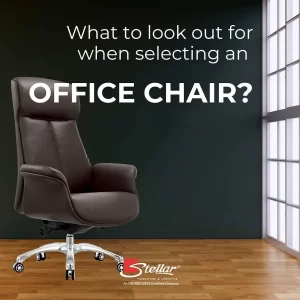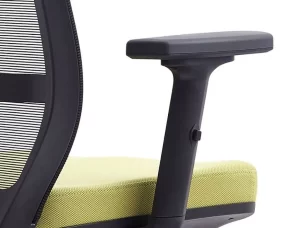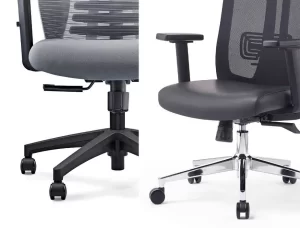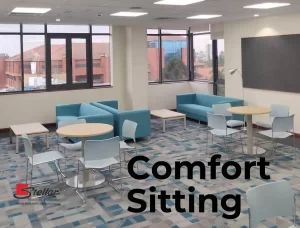As furniture retailers, you understand that the chair your customers choose holds the key to their daily comfort and overall well-being. The average person spends approximately 6.5 hours per day seated in their office chair. That’s a substantial portion of the day, underscoring the critical need for an office chair that not only delivers comfort but also provides the necessary support in all the right places.

The consequences of poorly chosen office chairs can be severe, contributing to health issues such as back pain, neck discomfort, and headaches. Needless to say, better chairs mean more satisfied customers and better business for you, as a furniture company.
This is where ergonomic office chairs take center stage. A must-have in the world of office furniture, these ergonomic office chairs play a pivotal role in promoting good posture and preventing the health problems we mentioned earlier. Crafted to support the body’s natural alignment, ergonomic chairs make those extended office hours not only bearable but also conducive to physical well-being.
As we embark on this journey together, we’ll dissect the intricacies of choosing the perfect office chair. For furniture retailers, understanding the nuances of these essential pieces goes beyond selling furniture – it’s about guiding your customers to invest in their daily comfort and productivity. After all, a well-selected office chair or work chair isn’t just a piece of furniture; it’s a strategic investment in the success and well-being of the workspace.
So, let’s explore the world of office chairs and ensure that every customer leaves with not just a chair, but a key asset in their professional journey.
Adjustable Height: The height of the office chair should be easily adjustable. This helps in keeping feet on the floor and arms even with the height of the desk. An office chair with a pneumatic gas lift will help in adjusting the seat height as per the user. A seat height of 16-21 inches generally works for most people.
Adjustable Backrest: A backrest with a locking mechanism can help the user adjust the back support as per their comfort. A slightly reclined posture helps in protecting the spine while using the chair for long hours. A 100-110 degree angle is recommended for long working hours.
Adjustable headrest: An adjustable headrest provides extra support for your neck and head, which can help to reduce pain and fatigue. It is particularly crucial for individuals who spend extended periods sitting at a desk. Headrests should be adjustable in height and angle to ensure a comfortable fit.
Adjustable armrests: Adjustable armrests allow users to adapt the chair to specific activities, such as typing, writing, or using a mouse, providing a versatile seating solution. Users can modify the armrest height to ensure that their arms are properly supported while typing or performing other tasks. This helps prevent discomfort and muscle fatigue associated with unsupported or improperly positioned arms.

Seat Dimensions: You need an office chair that is large enough to accommodate the general body size. Avoid selecting a seat that is too narrow or broad. Deep chairs cause the user to hunch forward, and wide seats make it uncomfortable to sit.
Material and Padding: It is very important to choose a well-padded seat base; hard surfaces are not good for long sitting hours. Having a cloth fabric or mesh back that allows breathing space helps in avoiding sweaty backs and discomfort.
Gas Lift: Hydraulic gas lifts in ergonomic office chairs are pivotal for customizable and comfortable seating. These lifts enable effortless height adjustments, accommodating diverse body types and desk configurations. The user can easily tailor the chair’s height to achieve an optimal ergonomic position, preventing strain and promoting better posture. Smooth and controlled elevation, facilitated by the hydraulic mechanism, ensures seamless transitions.
This feature is particularly crucial in shared workspaces, catering to individuals of varying heights. Additionally, hydraulic gas lifts enhance the overall durability of office chairs, providing a reliable and long-lasting solution. In summary, these lifts contribute to a healthier, more adaptable, and user-friendly ergonomic office chair experience.
Mechanism: The mechanism is the part of the office chair that controls the recline function. There are two main types of mechanisms: synchro-tilt and multi-tilt. Synchro-tilt mechanisms allow the seat and backrest to recline together at a ratio of 2:1. This means that the backrest will recline twice as far as the seat. Multi-tilt mechanisms allow you to adjust the angle of the seat and backrest independently.
Quality of upholstery: The quality of the upholstery will affect the comfort and durability of the chair. Choose a chair with upholstery that is breathable and easy to clean. Fabric Leather and Mesh are two popular choices for office chair upholstery. Leather is durable and easy to clean, but it can be hot and sweaty in warm weather. Mesh is breathable and comfortable, but it may not be as durable as leather.

Quality of base: The base is the foundation of the chair, and it needs to be strong and durable to support the weight of the user. The quality of the base will affect the weight-bearing capacity of the chair. Choose a chair with a base that is made from a strong and durable material, such as nylon, steel, or aluminum. The base should also be large enough to provide stability.

Castor wheels: Castor wheels play a pivotal role in the functionality and mobility of ergonomic office chairs. Engineered for smooth movement, these wheels facilitate easy chair maneuverability across various flooring surfaces. The swivel action allows users to effortlessly glide between workstations, promoting convenience and efficiency. Office chairs equipped with castor wheels enhance flexibility, enabling users to reach items or collaborate with colleagues without exerting excess effort.
Furthermore, the wheels’ design minimizes noise, contributing to a quieter and more conducive work environment. Hard wheels are suitable for carpeted surfaces, while soft wheels are more appropriate for tile floors. The use of hard wheels on tiled flooring may result in skidding.
The “weight-bearing capacity” of an office chair refers to the maximum amount of weight that the chair is designed to support safely. It is a crucial specification to consider when selecting an office chair, as exceeding the weight limit can lead to structural damage, reduced durability, and potential safety hazards.

Office chairs typically come with a specified weight-bearing capacity that indicates the maximum load the chair can withstand. This capacity includes the weight of the person using the chair along with any additional items they may have, such as a laptop or briefcase.
When choosing an office chair, it’s important to select one with a weight capacity that comfortably accommodates the intended user’s weight. This ensures the chair remains stable, functions properly, and provides a safe and comfortable seating experience. Exceeding the weight limit may lead to premature wear and tear, compromising the chair’s structural integrity and posing a risk to the user.
Understanding and aligning with regional standards and market trends regarding weight-bearing capacity is essential when sourcing office chairs from manufacturers and suppliers, especially in a global context. Different regions may have varying regulations, standards, and customer expectations, impacting the specifications and features of office furniture for e.g. the weight-bearing capacity requirement in the UK is usually 110-120 Kg while in the US it is 150 Kg or more.
The weight-bearing capacity of office chairs in Australia typically ranges from 120kg to 230kg. Standard adjustable chairs are usually rated up to 120kg, while heavy-duty chairs can support up to 230kg or more.
Resellers should stay informed about the weight-bearing capacity requirements specific to the markets they serve. This knowledge ensures that the chairs they offer meet or exceed local standards, contributing to customer satisfaction, safety, and compliance with regulations. Working closely with manufacturers and suppliers in China, resellers can communicate these regional requirements to ensure the production of office chairs that meet the desired weight-bearing capacity for their target markets. This proactive approach enhances the reseller’s ability to provide products that align with customer expectations and regulatory guidelines in different regions.

While highly adjustable ergonomic chairs with advanced features are ideal for personalized comfort, there is a distinct need for non-revolving, non-adjustable chairs with fixed legs in certain settings. Often found in waiting areas or as visitor chairs, these simpler alternatives are cost-effective, low-maintenance, and straightforward. Their fixed design offers durability, space efficiency, and quick setup, making them practical solutions for environments where customization isn’t the primary requirement. Let’s explore the features and benefits that make non-revolving, non-adjustable chairs a valuable choice in various settings. Non-adjustable chairs, while lacking the intricate features of highly adjustable ergonomic chairs, serve specific purposes and offer distinct advantages:
Cost-Effective: Non-adjustable chairs are generally more budget-friendly, making them a practical choice for bulk purchases in waiting areas or visitor spaces.
Low Maintenance: With fewer moving parts, non-adjustable chairs are easier to maintain. There are fewer components that may require repairs, reducing upkeep costs.
Simplicity: Non-adjustable chairs are straightforward and easy to use. Users don’t need to spend time figuring out various adjustments, making them ideal for public spaces with diverse users.
Durability: The simplicity of design often translates into increased durability. Non-adjustable chairs can withstand heavy use without the risk of mechanical issues.
Space Efficiency: These chairs are often compact and space-efficient, making them suitable for environments where maximizing seating capacity is a priority.
Uniformity: In spaces like waiting areas, uniformity in design is often preferred. Non-adjustable chairs provide a consistent look without the need for individual adjustments.
Quick Setup: Non-adjustable chairs are ready to use without the need for configuration. This makes them ideal for temporary seating arrangements or spaces with a high turnover of users.
Versatility: While lacking in customization, non-adjustable chairs come in various styles and materials, allowing for flexibility in design to match the aesthetic of different spaces.
In summary, non-adjustable chairs offer a cost-effective, low-maintenance solution with simplicity, durability, and versatility, making them suitable for specific settings like waiting areas or visitor spaces.
Comfort seating, also known as soft seating, is a trending category in modern office furniture design that prioritizes ergonomic and comfortable seating solutions. This category focuses on chairs and seating arrangements that incorporate plush materials, ample cushioning, and ergonomic design elements to enhance the overall comfort and well-being of individuals during extended periods of sitting.

Soft sitting options often feature padded seats, backrests, and sometimes even armrests, providing a more cushioned and supportive experience. This trend responds to the growing awareness of the importance of employee comfort and health in the workplace, aiming to create inviting and cozy spaces that contribute to productivity and overall job satisfaction. Soft seating is commonly found in collaborative areas, lounges, and informal meeting spaces within modern office layouts.
When purchasing office chairs from a factory in China as a reseller or importer, various commercial considerations should be taken into account to ensure a smooth and successful business transaction. Here are key commercial points to consider:
Quality Assurance: Request samples and thoroughly assess the quality of the chairs. Ensure they meet your standards and those of your target market. Considerations include materials used, construction, finish, and overall durability.
Compliance and Standards: Verify that the chairs comply with relevant international standards and regulations like ANSI, BIFMA, etc., especially those specific to the markets you plan to sell in. This includes safety standards, environmental regulations, and any industry-specific certifications.
Customization Options: Check the flexibility of the factory in terms of customization. Determine whether they can accommodate specific design changes, materials, colors, or branding to meet your clients’ preferences.
Production Capacity and Lead Times: Understand the factory’s production capacity and their ability to meet your order volume. Clarify lead times and production schedules to ensure timely delivery and fulfillment of customer orders.
Pricing and Payment Terms: Clearly establish the pricing structure, including any bulk discounts, MOQs (Minimum Order Quantities), and payment terms. Negotiate favorable terms that align with your business model and cash flow requirements.
Shipping and Logistics: Discuss shipping arrangements, including freight costs, shipping methods, and responsibilities for handling customs clearance. Clear communication on logistics helps avoid delays and unexpected costs.
Communication and Language: Establish effective communication channels with the factory. Ensure there are no language barriers that could lead to misunderstandings. Clear communication is essential for successful collaboration.
After-Sales Support: Inquire about the factory’s policies and procedures for addressing quality issues, returns, or defects. A reliable after-sales support system is crucial for maintaining customer satisfaction and resolving potential problems.
Reputation and References: Research the factory’s reputation in the industry. Seek references from other clients, if possible, and look for reviews or testimonials that provide insights into their track record and reliability.
Legal and Contractual Considerations: Work with legal professionals to draft a comprehensive and clear contract. Address aspects such as product specifications, quality standards, delivery terms, payment terms, and any other critical details. A well-structured contract helps protect both parties and ensures a transparent business relationship.
By carefully considering these commercial points, you can establish a strong foundation for a successful and mutually beneficial relationship with an office furniture factory in China.
Stellar, is the best office furniture and office chair manufacturer based in China, with an impressive 32-year legacy and a global footprint in over 100+ countries. Specializing in crafting top-notch office furniture, we take pride in our expertise, creating work chairs that stand out in both design and functionality.

Our star products include high-quality modern office chairs, designed to go beyond the ordinary. What sets us apart is our commitment to convenience – our office chairs come equipped with an advanced cable management system, simplifying your workspace setup.
But these work chairs are more than just furniture; they are meticulously crafted works of art. Using premium materials, we pay attention to every detail to guarantee perfection. Our work chairs aren’t just pieces of furniture; they are the centerpieces of your office, creating an environment where ideas and productivity seamlessly come to life.
Stellar doesn’t stop at office chairs; we offer a comprehensive range of office solutions, including workstations, storage cabinets, and office partitions. Our goal is to meet all your modern office furniture needs. Whether you’re upgrading your personal workspace or restocking your store, partner with Stellar for top-tier ergonomic chairs and work chairs.
Elevate your workspace with the perfect blend of style, functionality, and innovation – choose Stellar for all your work chair, office chair, and office furniture requirements.
Conclusion: In the world of office furniture, the office chair takes center stage, impacting comfort and productivity. Stellar, the leading office furniture and office chair manufacturer from China with a 32-year legacy, understands this significance.
As we navigated through the intricacies of choosing the perfect office chair, we discovered key factors that can transform an office chair from mere furniture to a strategic investment in the success and well-being of any workspace. The importance of adjustable height, backrest, seat dimensions, material and padding, and the often-overlooked castors and wheels cannot be overstated.
Ready to transform your workspace with top-tier office chairs and office furniture? Elevate your office environment, boost productivity, and invest in success with Stellar. Explore our range of ergonomic chairs and comprehensive office solutions today. Choose Stellar for unparalleled quality, style, and innovation. Upgrade your workspace – because your office deserves the best. Contact us now to bring Stellar into your professional journey!
Email: contactus@stellarglobal.com
Visit our Website: www.stellarglobal.com
You can schedule a meeting with Stellar: https://calendly.com/stellarglobal/45min

Stellar Global is a leading international office furniture manufacturer and supplier with over 34 years of industry experience, crafting ergonomic chairs, desks, workstations, and commercial furniture shipped to customers around the world.
From Designing and Manufacturing to Installation, One stop solution for office furniture and Large Projects 